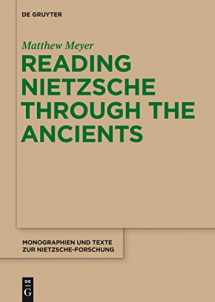
Reading Nietzsche through the Ancients: An Analysis of Becoming, Perspectivism, and the Principle of Non-Contradiction (Monographien und Texte zur Nietzsche-Forschung, 66)
ISBN-13:
9781934078419
ISBN-10:
1934078417
Edition:
1
Author:
Matthew Meyer
Publication date:
2014
Publisher:
De Gruyter
Format:
Hardcover
317 pages
Category:
Greek & Roman
,
Philosophy
,
Modern
FREE US shipping
Book details
ISBN-13:
9781934078419
ISBN-10:
1934078417
Edition:
1
Author:
Matthew Meyer
Publication date:
2014
Publisher:
De Gruyter
Format:
Hardcover
317 pages
Category:
Greek & Roman
,
Philosophy
,
Modern
Summary
Reading Nietzsche through the Ancients: An Analysis of Becoming, Perspectivism, and the Principle of Non-Contradiction (Monographien und Texte zur Nietzsche-Forschung, 66) (ISBN-13: 9781934078419 and ISBN-10: 1934078417), written by authors
Matthew Meyer, was published by De Gruyter in 2014.
With an overall rating of 3.9 stars, it's a notable title among other
Greek & Roman
(Philosophy, Modern) books. You can easily purchase or rent Reading Nietzsche through the Ancients: An Analysis of Becoming, Perspectivism, and the Principle of Non-Contradiction (Monographien und Texte zur Nietzsche-Forschung, 66) (Hardcover) from BooksRun,
along with many other new and used
Greek & Roman
books
and textbooks.
And, if you're looking to sell your copy, our current buyback offer is $0.3.
Description
Nietzsche's work was shaped by his engagement with ancient Greek philosophy. Matthew Meyer analyzes Nietzsche's concepts of becoming and perspectivism and his alleged rejection of the principle of non-contradiction, and he traces these views back to the Heraclitean-Protagorean position that Plato and Aristotle critically analyze in the Theaetetus and Metaphysica IV, respectively. At the center of this Heraclitean-Protagorean position is a relational ontology in which everything exists and is what it is only in relation to something else. Meyer argues that this relational ontology is not only theoretically foundational for Nietzsche's philosophical project, in that it is the common element in Nietzsche's views on becoming, perspectivism, and the principle of non-contradiction, but also textually foundational, in that Nietzsche implicitly commits himself to such an ontology in raising the question of opposites at the beginning of both Human, All Too Human and Beyond Good and Evil.


We would LOVE it if you could help us and other readers by reviewing the book
Book review

Congratulations! We have received your book review.
{user}
{createdAt}
by {truncated_author}


